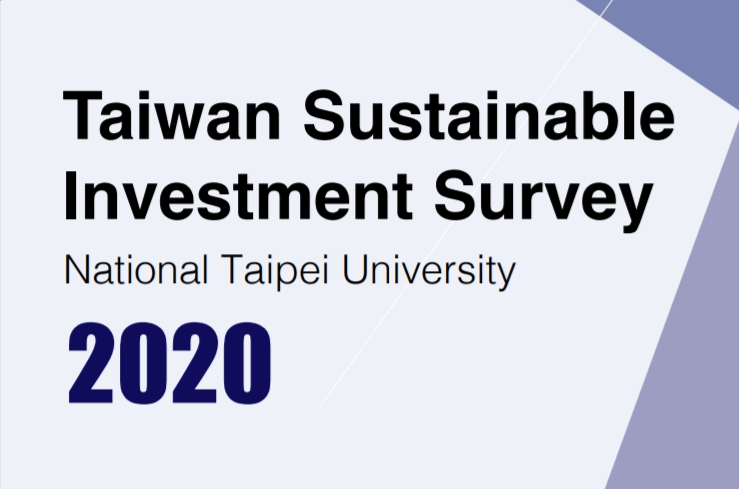News

Following the release of the summary report at the end of last year, the College of Business Center for Corporate Sustainability officially released the full text of the latest "Taiwan Sustainable Investment Survey". The survey found that the current sustainable investment assets in Taiwan are about NT$1.3 trillion, of which nearly 80% adopt "negative/exclusive stock selection." Plus, the overall investor response rate is 60%; hence, the increase on the rate is expected.
Hard hit by the COVID-19 epidemic, the global financial market fluctuated violently in 2020. However, various research and investment markets have shown that companies or related funds that perform well in "sustainability" have relatively outstanding performance in all aspects. In order to grasp the performance of Taiwanese institutional investors in sustainable investment, organized by the National Taipei University Center for Corporate Sustainability and sponsored by Cathay Financial Holdings, the "Taiwan Sustainability Investment Survey" was conducted to understand the current situation of Taiwan's sustainable investment through questionnaires.
99 institutional investors from Taiwan are invited to participate the survey, including 26 insurance companies, 59 securities investment trust and consulting companies, and four government funds. Furthermore, the Financial Supervisory Commission Republic of China (Taiwan), the Taiwan Stock Exchange Corporation and associations assist in communicating with institutional investors. Of all questionnaires, 59 valid ones were recovered and 37 companies provided the amount of assets for sustainable investment.
The survey results revealed that the share of SRI in AUM is 31.7% in Taiwan. The insurance industry accounts for NT$12 trillion, government funds account for NT$1 trillion, and securities investment trust and consulting companies account for NT$0.6 trillion. The team explained that the relatively small amount of sustainable investment by securities investment trust and consulting companies appears to be related to their less willingness to fill their sustainable assets. In the future, the team will communicate with these companies, hoping that the survey results will reflect Taiwan sustainable investment practices.
In terms of investment management methods, referring to the definition of sustainable investment by various promotion agencies including GSIA (Global Sustainable Investment Alliance), the research team categorized the methods into 8 different groups. They are negative/exclusionary screening, positive/best-in-class screening, norms-based screening, ESG integration, sustainability-themed investment, impact investing, exercising voting rights, and engagement & shareholder proposals. According to statistics, nearly 80% of investment adopts the negative/exclusionary screening, the trend that is consistent with international trend of sustainable investment.
Although the negative/exclusionary screening is the most common method, the research team regards it as a more passive method. It is recommended that institutional investors adopt ESG integration and sustainable themed investments when developing their own sustainable investment strategies. More active and linked to financial performance, these methods not only help create win-win investment results for financial performance and ESG performance, but are in line with the sustainable investment trend in North America.
Although the negative/exclusionary screening is the most common method, the research team regards it as a more passive method. It is recommended that institutional investors adopt ESG integration and sustainable themed investments when developing their own sustainable investment strategies. More active and linked to financial performance, these methods not only help create win-win investment results for financial performance and ESG performance, but are in line with the sustainable investment trend in North America.
The host of the team, Professor Chi-Jui Huang of the Department of Finance and Cooperative Management, said that this research was carried out in line with the FSC Green Finance Action Plan 2.0 and Corporate Governance 3.0 policies, and was conducted in a method recognized by international institutions. The results of the research can be used by domestic and international stakeholders who are interested in sustainable investment of Taiwan. He predicted that in the future, the team will also follow up surveys every year and release research reports regularly, looking forward to promoting the steady and positive development of Taiwan's sustainable investment, and working with relevant institutions to create a friendly environment for Taiwan's sustainable investment.
The full text of the research report has been published on the website of the College of Business Center for Corporate Sustainability, NTPU. Those who are interested in Taiwan's sustainable investment are welcome to download it.
contact:Research assistant of Center for Corporate Sustainability Meng-Ju, Kao
tel:(+886)2 26741111#66410
date:2021-04-19 16:45:51
file:2020 Taiwan Sustainable Investment Survey




